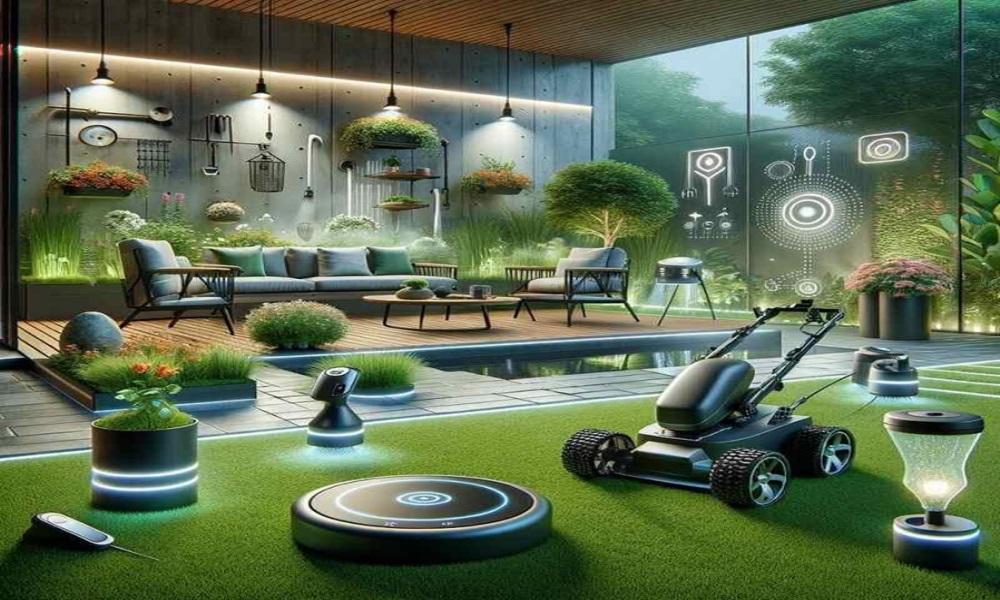In an age where technology seamlessly blends into every aspect of our lives, gardening too has undergone a digital revolution. The traditional image of gardening, often associated with rural settings and time-intensive care, is being reimagined in the context of modern, urban lifestyles. Today’s gardeners, equipped with an array of high-tech tools, are finding that maintaining a lush, thriving garden is not just possible but also more enjoyable in their busy lives. This article explores the innovative world of high-tech gardening tools tailored for modern living spaces. These tools are revolutionizing the way we approach gardening, transforming it from a labor-intensive chore to a tech-driven, rewarding experience.
Revolutionizing Gardening with Smart Technology
The integration of smart technology in gardening tools has brought about a paradigm shift in how we interact with our plants. Automated irrigation systems, for example, have replaced the traditional watering can. These systems are designed to deliver the precise amount of water needed by plants, at the right time, ensuring optimal growth conditions. They are especially beneficial for urban dwellers who may not have the time to water plants daily.
Similarly, soil sensors have become an invaluable tool for gardeners. These devices provide real-time data on soil moisture, pH levels, and nutrient content, allowing gardeners to tailor their care to the specific needs of each plant. This targeted approach not only promotes healthier plant growth but also conserves resources by preventing overwatering and excessive fertilizer use.
Another significant advancement is the development of app-controlled garden management systems. These applications allow gardeners to monitor and control various aspects of their garden from their smartphones or tablets. From scheduling watering sessions to receiving alerts about potential plant health issues, these apps offer a level of convenience and control that was unimaginable a few years ago.

The Rise of App-Controlled Garden Environments
The emergence of app-controlled garden environments marks a significant milestone in the evolution of urban gardening. These systems empower gardeners to manage their gardens remotely, making gardening more accessible for those with hectic schedules or limited physical abilities.
For instance, smartphone-controlled watering systems enable gardeners to manage their garden’s irrigation from anywhere, at any time. This is particularly useful for those who travel frequently or live in areas with variable weather conditions. Light-adjusting technologies have also gained traction, especially for indoor gardens. These systems automatically adjust the intensity and spectrum of light to mimic natural sunlight patterns, enhancing plant growth in environments with limited natural light.
Climate control equipment designed for indoor gardens is another area where technology is making a significant impact. These systems maintain optimal temperature and humidity levels for indoor plants, creating a controlled environment that can support a wide range of plant species, from common houseplants to exotic tropical varieties.
Sustainable Gardening in Urban Spaces
As urbanization continues to rise, sustainable gardening practices have become more important than ever. High-tech gardening tools are playing a crucial role in promoting sustainability in urban spaces.
Water conservation technologies are at the forefront of this movement. Drip irrigation systems, for example, deliver water directly to the base of the plant, minimizing evaporation and runoff. Moisture sensors further enhance water efficiency by ensuring that plants are watered only when necessary.
In addition to conserving water, high-tech tools are also enabling urban gardeners to diversify their plant selections. With advancements in hydroponic and aeroponic systems, gardeners can grow a wider variety of plants, including vegetables and herbs, without the need for traditional soil-based planting. This not only adds to the aesthetic value of urban spaces but also contributes to local food production and biodiversity.
The Future of Gardening – Trends and Innovations
Looking to the future, the field of high-tech gardening is poised for even more groundbreaking innovations. One of the most exciting developments is the integration of artificial intelligence (AI) in garden management. AI-driven garden assistants, capable of learning and adapting to specific garden environments, are set to revolutionize the way we approach plant care.
Emerging technologies like Virtual and Augmented Reality are revolutionizing garden planning and management. These innovations enable gardeners to create and tweak their garden layouts in a simulated setting, ensuring optimal design and preemptively spotting potential challenges. Equally exciting is the advent of robotic gardening aids. These advanced tools, armed with sensors and AI, are designed to handle routine tasks like weeding, pruning, and harvesting. While these technologies are still evolving, they hint at a future where gardening becomes less labor-intensive, broadening its appeal. Discover these advancements and more in Huxo Home’s modern gardening tools, promising to transform gardening into a more inclusive and enjoyable activity.
The integration of high-tech tools in gardening is not just a testament to human ingenuity; it is a reflection of our evolving relationship with nature. These tools have made gardening more accessible, efficient, and enjoyable, especially for those living in urban environments. They allow us to stay connected with nature, despite our busy lifestyles, and play a vital role in promoting sustainable living practices. As we look to the future, it is clear that technology will continue to shape and redefine our gardening experiences, bringing us closer to nature in ways we never imagined possible.
Frequently Asked Questions
What are the Best High-Tech Tools for Urban Gardening?
The best high-tech tools for urban gardening include smart irrigation systems, which automate watering schedules, soil moisture sensors for optimal watering, and smart plant monitors that provide real-time updates on plant health. Other popular tools are LED grow lights for indoor plants and automated climate control systems for greenhouses.
How Do Smart Irrigation Systems Work?
Smart irrigation systems work by using sensors and programmable controllers to regulate the watering schedule of a garden based on various factors like soil moisture levels, weather conditions, and plant type. These systems can be controlled remotely via smartphone apps, allowing gardeners to customize watering plans, conserve water, and ensure healthy plant growth.
Can Technology Help in Growing Plants Indoors?
Yes, technology can significantly assist in growing plants indoors. LED grow lights provide the necessary spectrum of light for photosynthesis, while hydroponic systems allow for soil-free growth with nutrient-rich water solutions. Smart indoor garden kits, equipped with automated lighting and watering, make it easier to grow herbs and vegetables indoors.
Are There Any Apps for Garden Planning and Maintenance?
Yes, there are several apps available for garden planning and maintenance. These apps offer features like plant identification, reminders for watering and fertilizing, customized garden planning tools, and advice on plant care. Some popular apps also integrate with smart gardening devices to provide a comprehensive gardening solution.
What is the Role of AI in Modern Gardening?
AI plays a significant role in modern gardening by providing advanced data analysis for plant care, optimizing watering and feeding schedules, and identifying potential plant diseases. AI-driven garden assistants can analyze environmental conditions and make recommendations for garden maintenance, thereby enhancing plant growth and health.


Comments are closed.